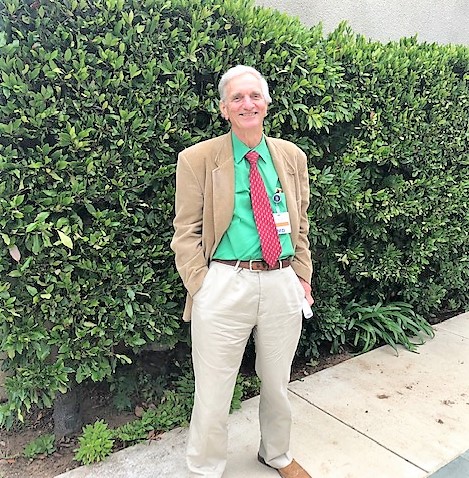
Dr. George Labrot is a sleep specialist who warns about the consequences of not receiving restorative sleep.
Sleep Is More Important Than You Think
Sleep specialists are trying to get the message out that if people do not get restorative sleep, they can suffer severe medical risks, even death.
The American Academy of Sleep Medicine reports that about 30 percent of adults in the U.S. regularly get insufficient sleep.
If a person snores, but still gets eight hours of sleep, is that sufficient?
“Loud snoring causes a person to pour out adrenaline,” said sleep specialist Dr. George LaBrot at a recent Palisades Optimist Club/Rotary Club meeting. “Instead of the body experiencing low blood pressure during rest, that person has a high blood pressure.”
Snoring is not a normal body function and interferes with sleep.
The “bad news,” according to LaBrot, is that people who fail to get restorative sleep may die sooner. “The ‘really bad news’ is they may suffer a stroke and have a disability for life.”
People have nearly double the risk of a stroke if they don’t have adequate sleep. LaBrot gave a CPAP (continuous positive airway pressure) machine to a patient, but when she stopped using it, she had a stroke.
“She had her warning shot,” LaBrot said, noting that the stroke caused a slurring of speech. “She’s now back on her CPAP machine and is in speech therapy.”
Why do we need sleep? “Nobody really knows what sleep is for,” said LaBrot, a longtime Palisadian. “Every organism has sleep, including bees. Birds and dolphins sleep one hemisphere at a time. Animals in hibernation come out of it, in order to sleep.”
Snoring prevents restorative sleep and there are several reasons people snore: 1) genetic, which means there is greater airway resistance between the bony and soft tissue of the throat. “Some people are built more crowded,” LaBrot said; 2) there are 18-pairs of muscles that are involved in speech and respiration, and “as you get older coordination slows down;” and 3) obesity, specifically around the diaphragm. “Sixty percent of obstructive sleep apnea comes from obesity.”
LaBrot said that people were built to walk 15 miles a day and that in the late 1800s, if one looks at photos, people looked gaunt. Lincoln, whom many people think looked unusually thin, was not.
Now, “obstructive apnea is becoming an epidemic because of obesity,” LaBrot said.
Children who do not get restorative sleep suffer with athletic and school performance problems.
“With pre-school children, sleepy children don’t look sleepy, they look out of control,” LaBrot said. “A psychologist can’t tell the difference between ADHD and lack of sleep.”
The consequences of poor sleep “are dire,” LaBrot said, and include depression, anger management problems, making wrong decisions and being accident prone.
If people with sleep apnea are not treated, they are more likely (in nonalcoholic patients) to have fatty liver disease that progresses to cirrhosis.
There is a link between lack of restorative sleep and increased risk of dementia. Those people with dementia see improvement if they have restorative sleep.
The cardiovascular system suffers, and in addition to a greater likelihood of strokes and heart attacks, people are more likely to have irregular heart rhythms and peripheral vascular insufficiencies.
Blood sugar is also affected, with a greater risk of Type II diabetes.
Lack of restorative sleep is a cause in fatal accidental deaths, suicide and a statistical increase in homicide. “People get grumpy if they don’t have sleep,” the doctor said.
How do you know if you’re not getting restorative sleep? “A common first symptom is having to get up in the night to urinate,” LaBrot said. He was asked if that could be a prostrate problem instead of a sleep problem. It turns out it could be both.
A patient told him, “I can’t use a CPAP because I have to get up eight times a night to use the bathroom.”
“I have solution for you,” said LaBrot, who put the person on a CPAP machine. “Now he’s only getting up twice a night.”
Many people have said they don’t want a CPAP because it’s too cumbersome, but LaBrot finds that most of his patients like theirs because they “wake up feeling fabulous and they haven’t felt that way in a long time.”
The doctor said that some dentists can make an oral appliance that holds the jaw and tongue forward, which stops the snoring. He also said there is an implantable hypoglossal nerve stimulator that can be turned on at night, that will help a person to rest.
“In children, even if they are fat, 90 percent can be cured [of sleep apnea] with a tonsillectomy,” LaBrot said.
If you snore or do not feel rested after eight hours of sleep, you might want to see a sleep specialist.
